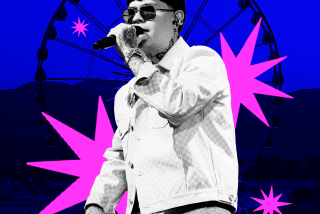A Mexican beat with roots that go deep
- Share via
When Ritchie Valens set America spinning to his hit record “La Bamba” in the late 1950s, few teeny-boppers probably knew they were dancing to son jarocho, a musical form whose pedigree goes back to the Renaissance. Harnessing 16th century Spanish lyric structures and Baroque-era instruments to jumpy Afro-Cuban slave rhythms, son jarocho is the signature roots music of Mexico’s Veracruz state. A hothouse hybrid of formal and funky, it was handed down for centuries from generation to generation, never catching on commercially but lovingly preserved in the backwater towns and villages of Veracruz as a kind of musical heirloom.
Then, in the late 1960s, just as it was heading for extinction, son jarocho was rediscovered by a cadre of anthropologists and academics. They began seeking out the old musicians, tape-recording their tunes and building an audio archive while spreading the word that rumors of son jarocho’s death had been greatly exaggerated.
If not for their efforts, the music today might be a dusty museum artifact. Instead, its resurgence is being celebrated on Saturday afternoon and evening in L.A.’s Second Festival of Jaraneros and Decimistas in California (Segundo Encuentro de Jaraneros y Decimistas) at the south end of downtown’s historic Olvera Street. Admission is free, but don’t forget to bring an extra ration of stamina: Son jarocho thrives on live, call-and-response interaction between performers and audience, and it’s not unusual for songs to stretch into extended instrumental jams mixed with wisecracking, improvised lyrics that riff on politics and current events. Fandango, the crisply eroticized dancing that accompanies son jarocho, sometimes goes on all night.
Eleven groups from across Southern California took part in last year’s inaugural son jarocho festival, which is one of only two such annual gatherings in the United States, says organizer Honorio Robledo, a painter, children’s book illustrator and cartoonist for La Opinion who also composes and plays the music that is his passion. This year’s version, with support from the Los Angeles County Arts Commission, the National Endowment for the Arts and El Instituto Cultural Mexicano, should attract even more aficionados to listen, dance and sample the cuisine that’s another distinctive component of jarocho culture.
But it’s in son jarocho’s mesmeric blending of 10-string guitars and diatonic harps that jarocho culture truly lives. “The attraction of the festival,” Robledo says, “is that the music is beautiful.”
*
Son jarocho
What: Second Festival of Jaraneros and Decimistas in California. Around the kiosk at Olvera Street Plaza, downtown Los Angeles Saturday, 3 p.m. Free.
Info: (213) 738-9858 or (626) 448-0194
More to Read
The biggest entertainment stories
Get our big stories about Hollywood, film, television, music, arts, culture and more right in your inbox as soon as they publish.
You may occasionally receive promotional content from the Los Angeles Times.










